Welcome to the February 2019 issue of the Global Washington newsletter.
IN THIS ISSUE
- Letter from our Executive Director
- Issue Brief: How Women’s Economic Empowerment Energizes Political Participation
- Organization Profile: Fair Trade USA, Empowering Women, One Fair Trade at a Time
- Changemaker: Abby Maxman, Oxfam America President and CEO
- Welcome New Members
- GlobalWA Member Events
- Career Center
- GlobalWA Events
Letter from our Executive Director
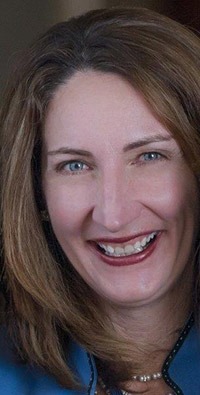
There is a growing understanding that placing women at the center of global development programs is critical to short- and long-term success. When it comes to economic empowerment, statistic show that when a woman gains her own income, she prioritizes investing in her children’s education and other family needs. This has an economic ripple effect from the household to the community and all the way up to strengthening national economies.
Sarah Hendriks, who heads up Gender Equality at The Bill and Melinda Gates Foundation, shared at the Global Washington conference last December that economic empowerment of women is also a powerful lever to achieving gender equity.
Global Washington member organizations have documented the increase in agency, voice and choice when a woman gains her own income. Increasingly, organizations are more intention in achieving this empowerment outcome through their economic development programs.
Unfortunately, this is not as simple as it sounds. Multiple barriers keep women from having a stronger voice in their household and community. Continuing with our theme of exploring solutions to so-called “wicked problems,” this month we have been unpacking the opportunity that economic empowerment of women presents, one that also often leads to greater civic engagement and political participation.
In our newsletter, we explore how Fair Trade USA’s model supports women’s economic opportunity and local leadership. We also profile Abby Maxman, Oxfam America’s president and CEO. If you missed our panel event earlier this month with senior leaders from Oxfam America, Fair Trade USA and CARE USA, you can watch the video recording here.
Global Washington is also supporting events focused on empowering women and girls in February and around International Women’s Day in early March. Check out our event page and I hope to see you at one of our up-coming events.

Kristen Dailey
Executive Director
Issue Brief
How Women’s Economic Empowerment Energizes Political Participation
By Joanne Lu
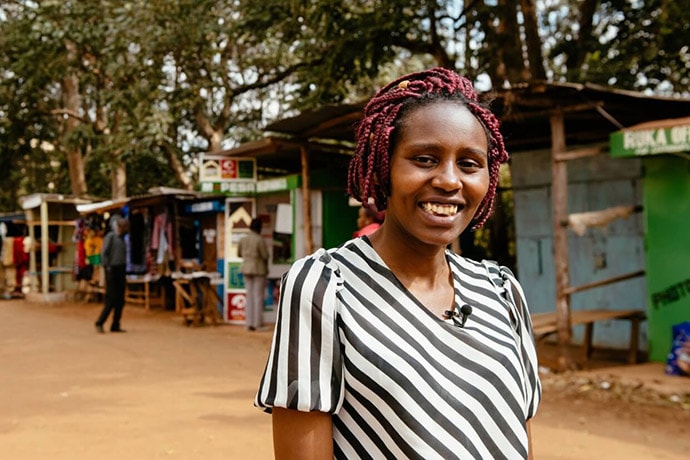
Zipporah, 23, who goes by “Zippy,” didn’t believe she had much of a future in Kenya. After receiving financial training and being connected to a business mentor, Zippy has become a leader in her youth group, as well as a savvy entrepreneur with two clothing shops and a cybercafe. She now sees herself as someone who can effect change in her community, and she says she intends to run for local office in the next election. Photo: Corinna Robbins / Mercy Corps.
Last November, American women made history when a record number of women won seats in the U.S. House of Representatives. This was not just a win for women. Research shows that when women have decision-making power, communities as a whole benefit.
Yet in many developing countries around the world, women struggle to even have a voice in their own homes. However, global development practitioners are finding that when women have more economic freedom, they often also gain voice and agency at the household level, community level and even beyond.
Women and girls are disproportionately affected by poverty, discrimination and exploitation. Globally, they bear the lion’s share of unpaid household work, which according to a recent Oxfam report would be equal to about $10 trillion in annual sales at a single company – or about 43 times that of Apple. If they do have access to employment opportunities, they’re often insecure, low-wage jobs, according to UN Women. Gender discrimination also hampers their access to assets – like land and loans – and their ability to make economic and social decisions.
All in all, poverty cannot be eradicated without gender equality.
That’s why development organizations and agencies have been focused on reaching women with economic empowerment programs. These include savings, cash transfers, microcredit, financial literacy training, skills training, cooperatives, market access, and other initiatives to help them gain access to economic resources.
The UN identifies three economic interventions that have proven to work for all women: savings, child-care provision and land rights. Other interventions are rated as proven or promising for poor, very poor, young and/or all women. For example, networks and mentors are promising for all women, while conditional cash transfers and demand-driven job services are proven to work for young women.
Global Washington member Awamaki helps women’s associations start and run small businesses that create artisanal products. According to Awamaki’s founder and executive director, Kennedy Leavens, the organization was founded on the belief that “income in the hands of women is the best way to lift communities out of poverty.”
“Women know what their children and their communities need and they make those investments when they have the means to do so,” she says.
At the household level, the extra income allows women to have more say in economic decision-making, often for the benefit of the whole family. Studies have found that women spend about 90 percent of their earned income on their families – for better food, school fees, health care – compared to men, who spend 30 to 40 percent on their families. For some, the extra savings, loans or income means they can start a business that serves their communities, as well.
But perhaps the most transformational impact is the empowerment.
CARE actually defines women’s economic empowerment as the process by which women increase not only their right to economic resources, but also their power to make decisions that benefit themselves, their families and their communities.
“When women earn an income, it makes them no longer dependent on men, so they have respectability,” says Conchi Maravilla, a coordinator for Oxfam’s Saving for Change program in El Salvador. “The women support each other, and it radiates out into the community.”
Oxfam’s Saving for Change program is a village savings and loans program that teaches women how to save money regularly, borrow from the groups’ pooled funds and repay loans with interest. Gathering regularly for savings groups, cooperatives or other economic activities has been shown to increase women’s confidence, facilitate collective action and improve their ability to negotiate with men.
According to Oxfam, “empowered women members” of their Saving for Change program have since asked for a suite of training modules to further increase their economic and political participation. For example, the “SfC + Citizenship” module teaches members about ID cards, paying taxes, having birth certificates for their children, voting, running for office and holding local leaders accountable for public services.
“Saving for Change is as much about strengthening member’s voices as it is about increasing their financial inclusion,” the organization’s website says.
According to Oxfam, participation in the savings groups are empowering women to get involved with – and even elected to – local decision-making bodies like village and municipal councils and water boards.
“Women participate in a more active way now,” Carlos Antonio Diaz, the mayor of Gualococti, El Salvador, told Oxfam. “Their capacity to speak out is more developed, and they have more positive self-esteem, which is important. They are more active than men in the community here.”
Women’s economic empowerment is an end goal in itself even as it serves as a means to women’s political participation. In the same way, women’s political participation is an end, but it can also be a great means of accelerating sustainable development, economically and otherwise.
Some suggest that gender equality in politics promotes gender equality in the workforce, which, according to a 2015 study, could double women’s contributions to global GDP growth. Women who have been empowered by financial inclusion programs are also influencing public policy from local to national levels for better labor laws, better representation in government, and greater investments in education and health for women and girls.
As Winnie Byanyima, the executive director of Oxfam International, said a few years ago, “…when you have more women in public decision-making, you get policies that benefit women, children and families in general.”
* * *
The following Global Washington members are supporting women’s economic empowerment and increased political agency.
Awamaki
Awamaki partners with women’s artisan cooperatives to create economic opportunities and improve well-being. The women knit, weave and host tourists in the rural Peruvian Andes. The organization helps them start and run successful cooperative businesses so they can earn income and lead their communities out of poverty. awamaki.org
CARE USA
Founded in 1945 with the creation of the CARE Package®, CARE is a leading humanitarian organization working in 93 countries to fight global poverty. Women and girls are at the heart of CARE’s community-based efforts to improve education and health, create economic opportunity, respond to emergencies and confront hunger. For over 25 years, CARE has been providing economic opportunities to women through its globally-recognized Village Savings and Loans Association model. A VSLA is a self-managed group that meets regularly and provides a safe place to save money, access loans, and get emergency insurance. CARE has directly supported nearly 7 million members in VSLAs across 45 countries. VSLAs provide unparalleled access to savings and credit for low-income women, accelerating their economic success and ability to navigate life’s inevitable shocks. The social networks they create empower women to join forces, raise their voices and achieve their goals. In Niger alone, one-third of women participating in local government come from VSLA groups initiated by CARE. https://www.care.org
Fair Trade USA
Fair Trade USA is a nonprofit organization and the leading certifier of Fair Trade products in North America. The organization’s rigorous standards around agricultural and factory production help protect fundamental human rights, ensure safe, healthy working conditions, protect the environment, and deliver additional economic resources to producing communities. Additionally, Fair Trade standards include a baseline price to protect farmers when the market dips too low, and ensures that producers earn additional Community Development Funds to address their pressing needs. Many groups vote to spend this money on projects that benefit women, like cervical cancer screenings, scholarships, child care centers and microloans for income diversification. https://www.fairtradecertified.org
Global Partnerships
Global Partnerships’ Women Centered Finance with Education and Health investment initiatives have invested $187 million in 65 partners in 17 countries across Latin America, the Caribbean, and sub-Saharan Africa. Through these strategies Global Partnerships invests in enterprises that deliver credit to female microenterpreneurs along with access to a savings account, education and/or basic health services. With access to these services, women living in poverty are able to improve their health and economic position as they practice prevention, seek timely treatment, make more informed decisions, smooth household income and consumption, build assets, and better deal with health and economic shocks. https://globalpartnerships.org
Grameen Foundation
Grameen Foundation is dedicated to enabling the poor, especially women, to create a world without poverty and hunger. The foundation’s programs connect poor rural women and their households to essential financial, health and agricultural products, while also building empowering ecosystems that support women’s breakthroughs. Access to financial services and training, in combination with structured “gender dialogues,” propel women’s economic empowerment. Working through women’s self-help groups and community partners, Grameen Foundation guides dialogues about traditional gender roles and their impacts on family well-being. This integrated approach increases women’s autonomy and encourages more gender-equitable decision-making in households on issues from finances to family planning. With increased capacity and autonomy, women are able to achieve greater economic empowerment in the family and beyond. https://grameenfoundation.org
Landesa
Landesa champions and works to secure land rights, a powerful tool to promote social justice and create opportunity for millions of people living in poverty around the world. For women especially, land rights can be transformative to their social and economic empowerment within households and communities. Equipped with secure land rights, women gain a stronger voice in household decision-making, spending, and management of their land. The resulting benefits can include greater savings and financial stability, improved nutrition and food security, and increased spending on education and health care, creating a ripple effect for women, their families, and whole communities. For more than 50 years, working across 50 countries, Landesa has helped strengthen land rights for an estimated 125 million families. https://www.landesa.org
Mercy Corps
Mercy Corps helps girls and women build economic independence by providing financial services such as grants, loans and community savings groups, mentorship and job training. For example, in Kenya, Mercy Corps helped girls develop skills to manage and sell small livestock, like bees and chickens, which improved girls’ average monthly incomes from $6 to $56 in West Pokot and from $26 to $87 in Turkana. Girls who participated also reported a 50% increase in household decision-making since the start of the program. Engaging women in household decision making and local governance is vital to creating inclusive governance and economic systems. In Mali, Mercy Corps worked with 120 women leaders to build basic leadership skills, enhance understanding of local governance processes and develop advocacy skills. Following the 12 months of training, 38 of the women leaders ran for office in local elections and 14 were elected. In 2018, Mercy Corps impacted the lives of more than 6.9 million women and girls through opportunities to improve their education, health, leadership and livelihoods. https://www.mercycorps.org
Oxfam America
Oxfam is a global organization working to right the wrongs of poverty, hunger, and social injustice. Globally, Oxfam works with 22.1 million people in more than 90 countries to create lasting solutions to the injustice of poverty and hunger. Oxfam works to increase women’s access to and control over resources as part of a larger focus on gender justice, aiming to transform gender power relations and norms through campaigning, programming, advocacy, and research to facilitate women’s articulation of their own voice and agendas. For over 13 years, Oxfam has been working through its Savings for Change program to build resilience and increase women’s empowerment by providing basic financial services to women around the world, as well as training in business skills, agriculture, active citizenship and advocacy, and mobile banking. Saving for Change is as much about strengthening member’s voices as it is about increasing their financial inclusion. Oxfam believes that strengthening women’s agency and space is an essential precursor to achieving gender equality as well as political, social, economic, cultural and environmental security. https://www.oxfamamerica.org
Street Business School
Street Business School (SBS) provides entrepreneurial education and confidence to women living in poverty. On average, graduates triple their income, going from $1.35/day to $4.19/day. This change in income is life-altering for alumni and their families. With increased earnings, SBS graduates educate their children, provide healthcare, increase their family’s daily meals, and discover their influence. SBS sees dramatic shifts with graduates’ confidence, creating a stronger voice in their families and their communities. SBS has trained 46 other NGOs how to incorporate this program into their communities because its partners share the belief that when a women is economically strong, the holistic benefits to all are invaluable. https://www.streetbusinessschool.org
Upaya Social Ventures
Upaya Social Ventures creates dignified jobs for women living in extreme poverty by building scalable businesses with investment and consulting support. Of the nearly 12,000 jobs created by Upaya’s investment portfolio companies, half are held by women, most of whom are entering the workforce for the first time. This is no coincidence, since half of Upaya’s active portfolio is comprised of women-led social enterprises. Upaya places a strong emphasis on investing in women entrepreneurs, a population largely underfunded in comparison with their male counterparts. The organization believes the more it demonstrates women’s success in entrepreneurship, the more likely it will be to kick-off a chain reaction of women-led ventures, job creation for women, and growing prosperity overall. https://www.upayasv.org
Organization Profile
Fair Trade USA
Empowering Women, One Fair Trade at a Time
By Arielle Dreher
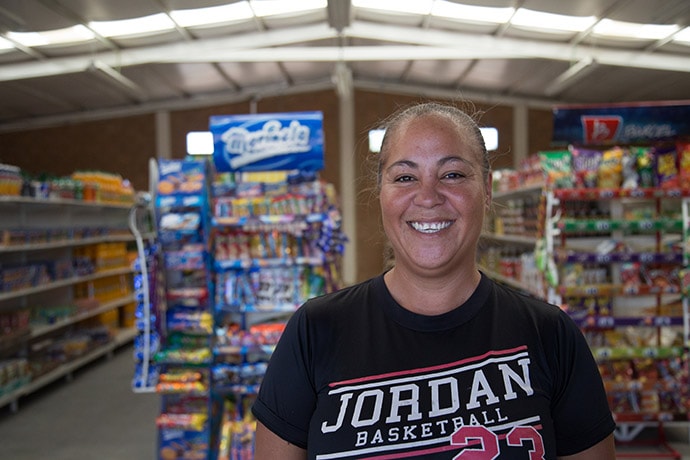
Fabiola Lauro, 33, from Imuris, Mexico, smiles inside the “Fair Trade Store”. Fabiola, a mother of two, has been working at Wholesum since 2012. Currently employed as a manager in the seedling section, she was elected as president of the Fair Trade Committee in 2016. Photo: James A. Rodriguez. © 2016 Fair Trade USA.
A thoughtful model and a little bit of encouragement is sometimes all that is needed to empower women in potentially intimidating workspaces. Or at least for Fabiola, this was the case.
Fabiola worked at a vegetable greenhouse in Sonora in northern Mexico when the farm decided to become Fair Trade certified. Fabiola, one of thousands of workers, was elected to be a representative on her farm’s Fair Trade Committee. She was shy and hesitated to speak in front of others. As a part of the committee, she received training and learned how to negotiate and represent her fellow co-workers’ concerns.
Nathalie Marin-Gest, Fair Trade USA Senior Director of Produce & Floral, visited Fabiola’s farm a year after she was elected to the committee.
Fabiola had embraced her new role whole-heartedly. Marin-Gest said Fabiola was firing a construction manager who was not doing a good job and hosting meetings with thousands of workers with ease. She was emboldened by being on the committee and learning how the farm production process worked. She was advocating for workers and communicating with suppliers regularly.
“I’d never spoken up in public—I was terrified to,” she told Marin-Gest at the time. “I didn’t want to accept the nomination but now I feel proud of myself for being able to do this, and my kid told me, ‘Mom, good job. I’m proud of you,’ and it was the most amazing moment.”
Moments like these reveal just how much deeper than a label on a bag of coffee or sweatshirt Fair Trade USA’s work goes. When we hear “fair trade,” it’s easy to simply acknowledge that a label like that ensures ethical practices and fair business, but the actual work of Fair Trade USA is much more intricate and weighty than that.
Fair Trade USA helps develop sustainable supply chains by setting rigorous social and environmental standards that farms, factories and fisheries around the world are certified against by third-party certification bodies. To achieve Fair Trade certification, Fair Trade USA has developed detailed certification criteria for the different product categories, like the Agriculture Production Standard (APS), which is more than 100 pages long. These standards set basic principles in each workplace like eliminating workplace discrimination, requiring equal pay for equal work, as well as ensuring that workers make at least minimum wage or above. These standards also include criteria around maternity leave for women and ensure that employers cannot force women to take pregnancy tests before they are hired, which is a practice unfortunately common on many farms that do not want to take on the supposed burden of hiring a woman who will need to leave to give birth.
The certifications and audits are really just the beginning of the work Fair Trade does with its members. As Marin-Gest puts it, “we provide a platform for farms, factories, fisheries to be able to integrate social compliance into their own program to write a framework…essentially helping to tie compliance and operations back to the human, in particular.”
Besides the impact created from compliance with the Fair Trade Standards, when products are sold with the Fair Trade Certified™ seal, a few extra cents go back to the workers and small producers. These Fair Trade Community Development Funds are pooled and used collectively on projects that help meet the needs of those within the scope of the certificate. In order to manage the funds appropriately and represent all participants, the APS has an Empowerment module that requires the formation of a Fair Trade Committee. Fair Trade USA requires its partners to map their workforce and see who actually works for the company in order to ensure that the Fair Trade Committee is made up of a group of people that actually represents the workforce (number of men or women, migrants or locals, or those with disabilities, job type, etc.). The general assembly of small farmers or workers then elects the committee members. A needs assessment of all the small farmers or workers (on large farms) is conducted to direct the decisions on how to use the Fair Trade Community Development Funds. The Fair Trade Committee then develops projects based on the needs of the general assembly members, their families and communities. Projects focus on helping to solve community problems and make work more accessible, particularly for women.
In Ecuador, women working on a floral farm that was Fair Trade Certified began to get sick. The women were working six days a week, and on Sundays, their only day off, women would go into the river to wash their family’s clothes. The high-altitude river was getting contaminated, and women were having bone and respiratory problems.
After the Fair Trade Committee at the farm looked deeply at the root causes of why so many women were getting sick, they decided to use their Fair Trade Community Development Funds to create a laundromat, employing an attendant to do the laundry, on-site at their farm. Women can now bring their family’s laundry to work and leave at the end of the day with clean, folded laundry. Suddenly, women actually had a day to rest at the end of a long workweek and were much healthier. Marin-Gest said that small innovation led to some women finishing up school or starting their own businesses.
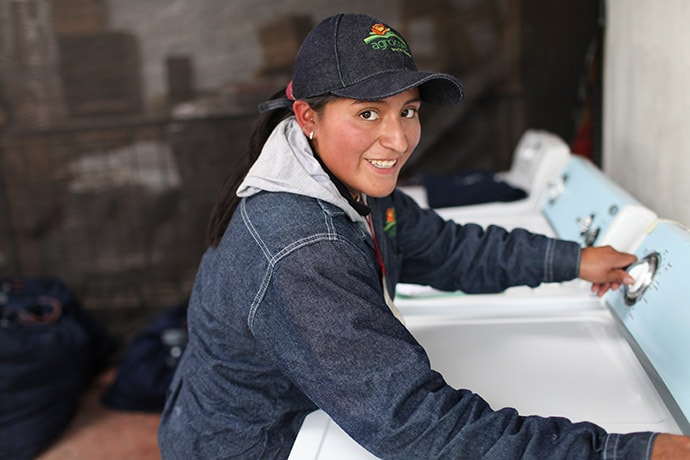
Luz Sisa, 24, from Mulalo, Ecuador, does her laundry at Agrocoex’s complementary laundry room. Luz, a mother of two, has been working at Agrocoex since 2010. Photo: James A. Rodriguez. © 2015 Fair Trade USA.
“Their lives have changed completely just from setting up a little laundromat program, because they dug deep and found out what was really happening; they were creative and found a solution that changed lives dramatically,” she said.
Farms, fisheries and factories that are Fair Trade Certified™ must continue to not only meet the certification standards but also continue to improve their workforce environments in order to keep their workers. Internationally, farmers have been experiencing labor shortages, and Marin-Gest said Fair Trade USA’s affiliates have actually seen just the opposite, due in part to the standards and good work environments those standards create for workers.
“People also care how they’re being treated and if they have a voice on that farm,” Marin-Gest said. “So what we’ve found with the Fair Trade program is that farms have gone from having extreme labor shortages to having waiting lists of workers who want to work there.”
This makes sense with a model that encourages workers to not only have better lives but also re-invest their Fair Trade Community Development Funds into programs that are good for the community. Marin-Gest pointed to examples like women creating their own sewing design shops or pig nurseries with the Community Development Funds, or building homes and communities near to farms, to eliminate commute stress or family separation. Fair Trade USA also provides financial literacy training, which really helps families plan their financial lives, as well.
Beyond fair, humane working conditions for workers around the world, Fair Trade USA is also helping empower women and their families to advocate for their rights and work to have more financially stable and secure lives in the future. Or as Marin-Gest puts it, looking at women like Fabiola and her child, “generations are getting impacted, as well.”
Changemaker
Abby Maxman, Oxfam America President and CEO
By Joanne Lu
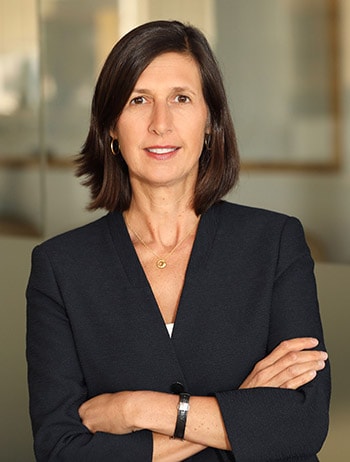 Abby Maxman was a long-time admirer of Oxfam America before she became its president and CEO in June 2017. Throughout her 30-year career in international aid and development, she has always been drawn to Oxfam’s underlying philosophy, “that systemic injustices keep people poor, and it’s not an accident,” says Maxman.
Abby Maxman was a long-time admirer of Oxfam America before she became its president and CEO in June 2017. Throughout her 30-year career in international aid and development, she has always been drawn to Oxfam’s underlying philosophy, “that systemic injustices keep people poor, and it’s not an accident,” says Maxman.
Maxman has dedicated her life’s work to fighting the injustice of poverty, but she didn’t always know this is how her career would unfold.
Maxman credits the Quaker school she attended as a child for exposing her to issues of social justice around the world. There, she was first confronted with shocking images from the 1984 famine in Ethiopia and institutionalized racism in apartheid South Africa. At the time, Nelson Mandela was still in prison and the HIV/AIDS epidemic was just beginning to hit the public consciousness.
Looking back, Maxman believes these events were seminal moments in her own awareness and connection with international issues. But even as she studied for a degree in political science and history, she wasn’t sure what she wanted to do.
“But I knew I had this vague, probably uninformed, interest of wanting to make a difference in the world,” she says.
Then, one rejection changed the course of her life. Maxman’s heart was set on a research fellowship in Latin America after college. But when someone advised her not to count on only one thing, she half-heartedly applied for the Peace Corps, as well. She was devastated when she didn’t get the fellowship. However, the Peace Corps wanted her, and she was soon on her way to Lesotho as an agriculture and community development worker.
“Without a doubt, that was probably the best thing that ever happened to me, because it opened this world to me of international humanitarian relief and development, multilateralism, the UN architecture – everything just opened up to me in that learning journey,” she says.
In Lesotho, she witnessed apartheid first-hand, as well as the fortitude and resilience of women who regularly faced financial exploitation and led their households in the absence of men, most of whom had left for South Africa as laborers.
To this day, those experiences continue to inform her view that poverty is a result of human action, inaction, decisions and political choices. “Poverty is political,” she says. “It’s about politics and power.”
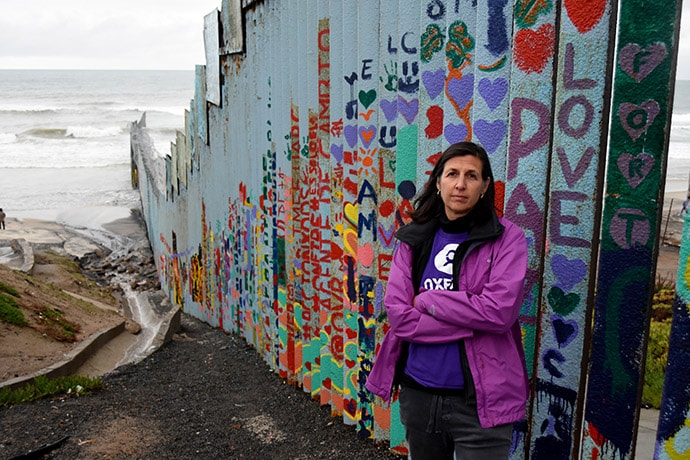
Oxfam America President Abby Maxman at the border wall separating the US and Mexico. Photo: Oxfam/Alyssa Eisenstein.
That’s why Oxfam’s three-prong approach to poverty and inequality is so compelling to her. “We help people build better futures for themselves; we save lives and alleviate suffering in disaster and humanitarian crises. But the real multiplier that takes impact to scale is policy advocacy.”
This is something that she has felt is “absolutely essential” as she’s navigated her lengthy career – from the Peace Corps to the World Food Programme, to the German development agency GTZ (now GIZ), to 20 years at CARE, where she eventually became the deputy secretary general of CARE International.
Now at Oxfam America, she plans to continue pushing for policy solutions to systemic issues, particularly around gender justice.
“I have seen in my career and all my learnings have shown this very simple thing: that when women and girls at the community-level have voice and choice about how decisions are made – at the household level, at the community level, at the local political level – families and communities are healthier and wealthier, period.”
Maxman has worked with many women’s economic empowerment programs, including Oxfam’s village savings groups program, Savings for Change. She’s witnessed how savings not only allows women to have more say in the health and education of their families, but also creates social cohesion, gives them a place to convene for support and community, opens up more economic opportunities,, and provides them the means to participate in socially important things, like funerals.
“The economic empowerment that can contribute to social and political participation has an exponential effect on households and communities,” says Maxman. “I’ve seen it be a very powerful changemaker in many places around the world.”
That includes the U.S., where Maxman says Oxfam America’s domestic program will continue to advocate for social change on issues of women’s rights, human rights, worker rights, and social justice for excluded and marginalized populations. It’s not just because injustice and poverty are wrong regardless of whether they’re in a developing or developed country, but also because what happens in the U.S. affects the rest of the world.
“The U.S. has a disproportionate influence on the world – for good and for bad,” she says. “Everything that happens in these United States affects global poverty, social justice, good governance, the rule of law, institutions – everything.”
Maxman is also committed to making sure Oxfam is a better model of equity in the workplace and on the frontlines of their work around the world.
“Gender justice has always been core to Oxfam, and yet we know we’re not always modeling that at the levels we want to,” she says. “I’m excited to see the transformative power of creating more equal societies and the power of bringing women’s voice and choice into what we do and how we do it.”
Welcome New Members
Please welcome our newest Global Washington members. Take a moment to familiarize yourself with their work and consider opportunities for support and collaboration!
Bloodworks Northwest
Bloodworks Northwest is an independent, non-profit organization harnessing donor gifts to provide a safe, lifesaving blood supply to more than 90 Northwest hospitals. Its mission is to save lives through research, innovation, education and excellence in blood, medical and laboratory services in partnership with its community. Bloodworksnw.org
Member Events
February 12: The Max Foundation // The Good, The Bad, & the Ugly: Global Access to Cancer Treatment
February 13: World Affairs Council // Is Globalization Sustainable?
February 13: The Henry M. Jackson School of International Studies at the UW // Reinventing Globalization with Dani Rodrik
March 1: Upaya // 2019 Upaya Gala
Career Center
Associate Minerva Strategies
Equal Justice Works Fellowship Northwest Immigrant Rights Project
Executive Administrative Assistant Mona Foundation
Communications and Marketing Manager Mercy Corps
Check out the GlobalWA Job Board for the latest openings.
GlobalWA Events
February 20: Women’s Land Rights: A Transformational Tool for Agency and Empowerment
March 8: Girl Rising – Film Premiere